Quantum Computing Statistics 2023 – By Segment Revenue, Country and Region, Healthcare Market, Best Stocks, Usage, Website and Companies
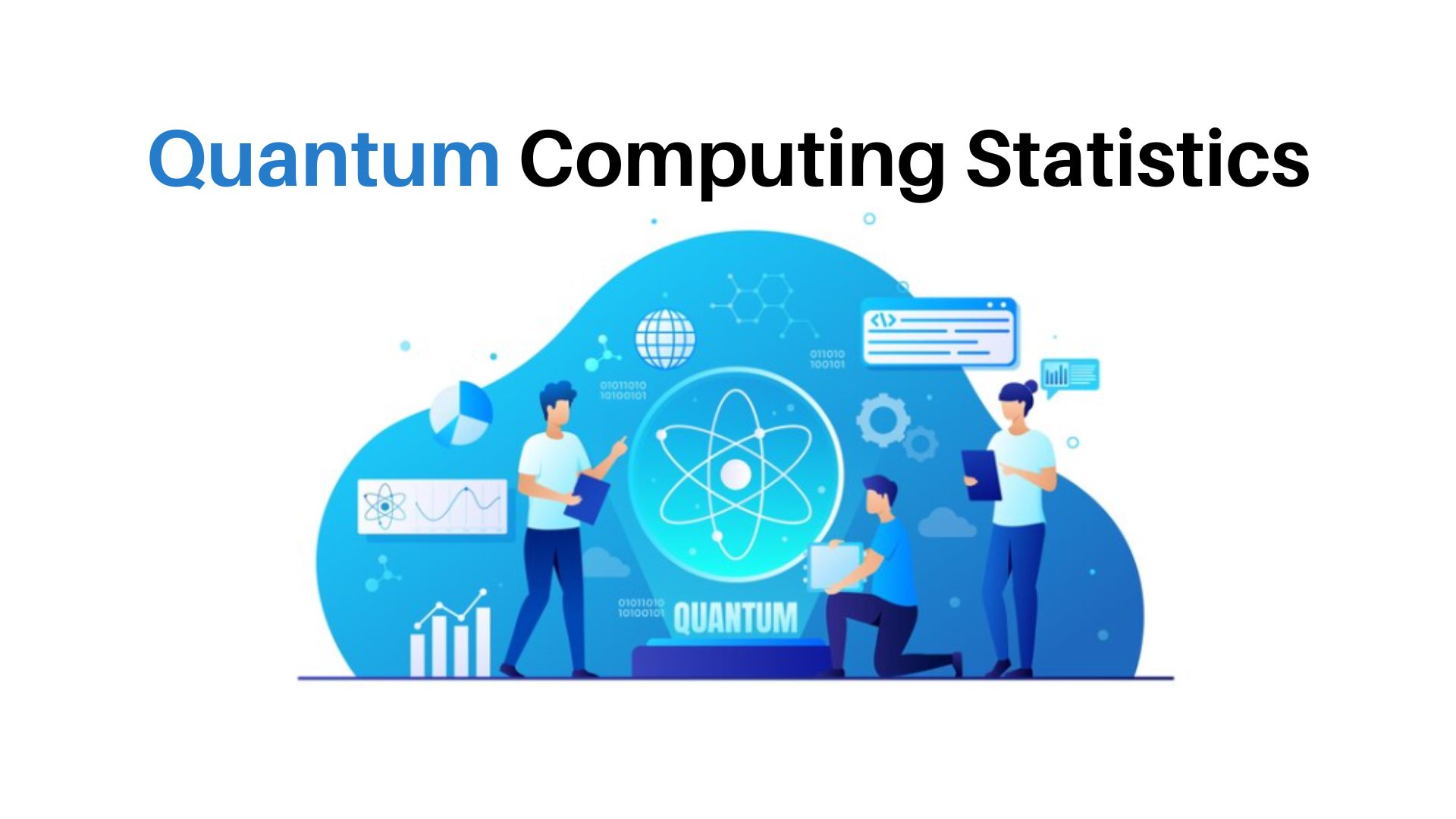
Page Contents
- Introduction
- Editor’s Choice
- General Quantum Computing Statistics
- Benefits of Quantum Computing
- Statistics by Segment Revenue
- Market Size According to Market.us
- Statistics by Country and Region
- Statistics by Healthcare Market
- Statistics by Best Stocks
- Statistics by the Company
- Statistics by Usage
- Top Trends of Quantum Computing
- Quantum Computing Statistics by Website
- Future of Total Market Share of Quantum Computing
- Efforts of Quantum Computing
- Challenges
- Conclusion
Introduction
Quantum Computing Statistics: The report says that the industry of Quantum Computing is expected to reach $4.35 billion by the end of 2028 with a CAGR of 38.3% from 2023 to 2028. The technology of quantum computing has an effective potential that allows for the dynamic reshaping of the strategic balance of military affairs.
Over the world many govt. are planning to deal with advanced quantum computing systems. It is expected that the demand for this computing is going to generate immersive market growth by 8.3 times its current size by the end of 2033.
These Quantum Computing Statistics include insights from various aspects that provide light on the importance of this theory.
Editor’s Choice
- According to Global News Wire reports for 2023, the market share of the Quantum Computing Market is going to generate around $866 billion and by 2028 market size is predicted to be $4,375 million with a CAGR of 38.3%
- On the other hand, by the end of 2033, the projected market size is expected to be $6.5 billion with a CAGR of 23.5% from 2023 to 2033.
- The market value of quantum computing remains highest in the United States in 2023 which is expected to be $2.1 billion with a compound annual growth rate (CAGR) of 22.2% from 2023 to 2033.
- In the United States LonQ, Inc. announced the establishment of the manufacturing plant of its first dedicated quantum computing in January 2023.
- The quantum computing growth in the BFSI segment is expected at a CAGR of 29.4% by 2023.
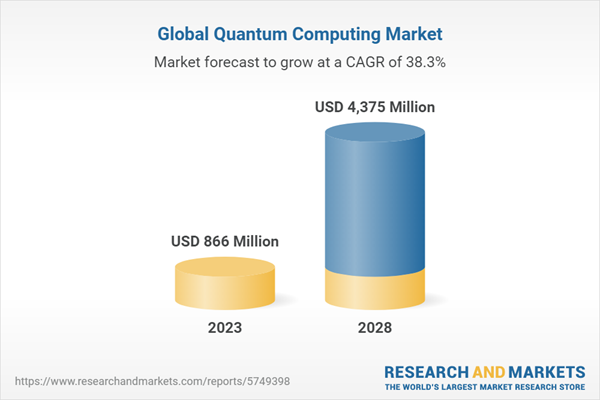
(Source: globenewswire.com)
General Quantum Computing Statistics
- The global count of quantum computers is expected to range from 2,000 to 5,000 units by the end of 2030.
- In each second the Sa 30 qubit quantum computer is cable in doing trillions of computations.
- As per the Market Splash 2023, the market share of quantum computing is predicted to be $928.8 million and by 2030 it is going to be $6,528.8 million with a CAGR of 32.1%.
- By the end of 2030, the market of quantum software and hardware is expecting huge growth with a CAGR of 30% and 35% respectively.
- The leading players in the Quantum computing industry in 2023 are IBM, Google, and Microsoft.
- Whereas, the largest shareholder of the quantum computing market is the United States with a 50% share in 2023.
- In the next two decades, quantum computing is going to be valued at almost $850 billion.
- More than $1.2 billion has been invested by the government of the United States in the research of quantum according to the reports of the National Quantum Initiative Act.
- The top 5 leading quantum computer types are followed by superconducting, photonic, neutral atoms, trapped ions, and quantum dots.
Benefits of Quantum Computing
- Mostly used by financial institutions as quantum computing helps in designing effective and efficient portfolios for institutional and retail clients.
- This is also used in healthcare industries for genetically targeted medical care and to develop new drugs.
- Other used areas are for designing data encryption, allow in providing stronger online security, using light signals for detecting intruders within the system, and providing safer traffic planning and aircraft systems.
Statistics by Segment Revenue
- The overall market share is segmented into three sections services revenue, software revenue, and hardware revenue.
- In 2023, the expected services revenue is around $15. Billion, software revenue ($18.1 billion), and hardware revenue ($63.6 billion).
- According to Market.us Scoop, the global quantum computing market size by component in 2023 is expected to be $63.6 billion and by 2032 it is going to be $460.7 billion.
Market Size According to Market.us
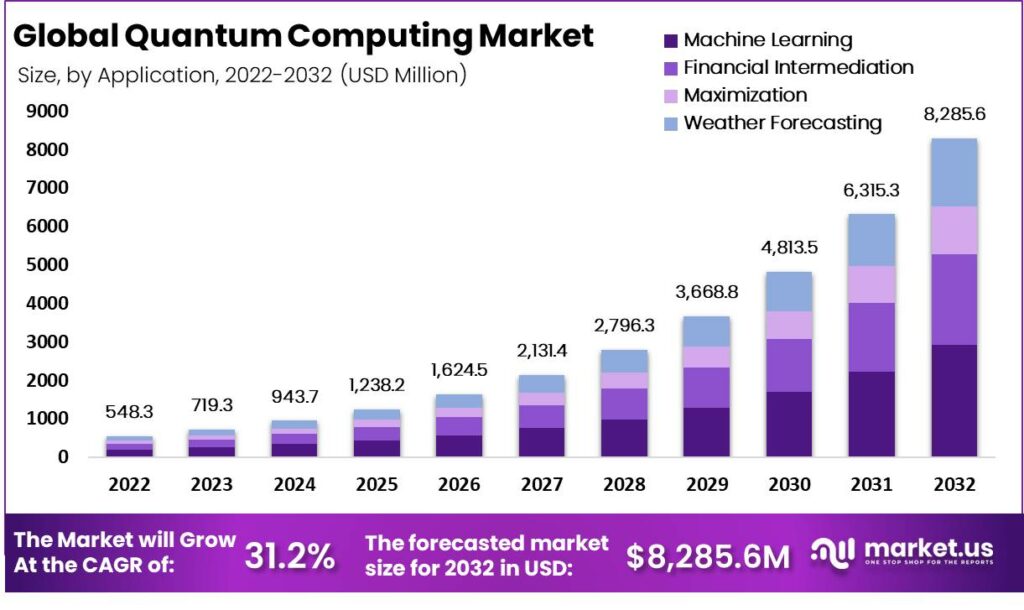
(Source: Market.us – Quantum Computing Market Report)
Statistics by Country and Region
- In 2023, the projected market value of quantum computing in the United States is going to reach $2.1 billion with a CAGR of 22.2% from 2023 to 2033.
- In the Asia Pacific region, significant growth has been observed in China and the projected market value is expected to be $554.7 million by the end of 2023 with a CAGR of 24.7% by 2033.
- On the other hand, in 2023 the market share of Japan is supposed to be $468.6 million with a CAGR of 22.9% from 2023 to 2033.
- Furthermore, other countries projected market values are followed by the United Kingdom ($326 million), and South Korea ($261.4 million) with a CAGR of 22.6% and 24% from 2023 to 2033 respectively.
- By the end of 2025, the CAGR growth of quantum computing in India is expected to be 33.9%.
- In terms of patent filings for quantum computing applications in China are expected to be more than 492 patents.
Statistics by Healthcare Market
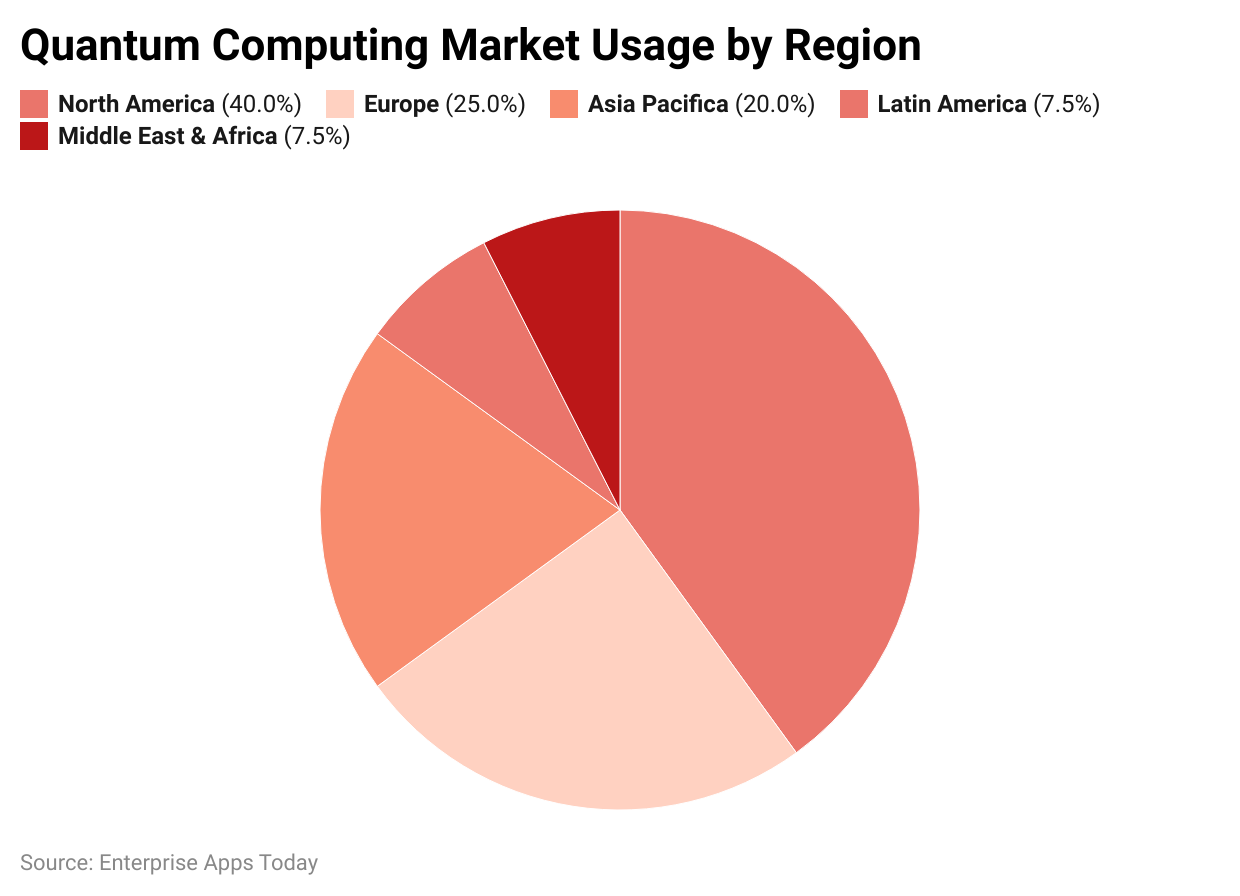
(Source: marketsandmarkets.com)
- The global market value of quantum computing in the healthcare market is expected to be $85 million.
- On the other side, by the end of 2028 is going to be $503 million which is expected to grow at a CAGR of 42.5% from 2023 to 2028.
- In the North American region, the healthcare market of quantum computing is going to hold the highest share around $342 million by the end of 2028.
- For developing a fully integrated quantum-safe solution for securing sensitive data transfer Quandela partnered with CryptoNext (both are France-based companies) in March 2023.
- For enabling top health research in the acceleration of biomedical discoveries along with becoming the world’s first quantum computer the IBM Quantum System One has partnered with Cleveland Clinic in March 2023.
Statistics by Best Stocks
- In 2023 according to the report of The Motley Fool, the best quantum computing stocks are D-Wave Quantum (QBTS +12.44%) AND Rigetti Computing (RGTI -1.85%).
- Start-up quantum computing company creating security software IS Arqit Quantum (ARQQ 7.91%).
- On the other hand, integrated software and hardware company Quantum Computing (QUBT 9.25%)
Statistics by the Company
- As of 2023, the market capitalization of IONQ is around $4 billion and this has traded stock publicly for the first time.
- Other company's market capitalization are followed by Microsoft ($2.5 trillion), Alphabet ($1.7 trillion), Nvidia ($1.1 trillion), Intel ($162 billion), Honeywell ($124 billion), IBM ($135 billion), Formfactor ($2.5 billion).
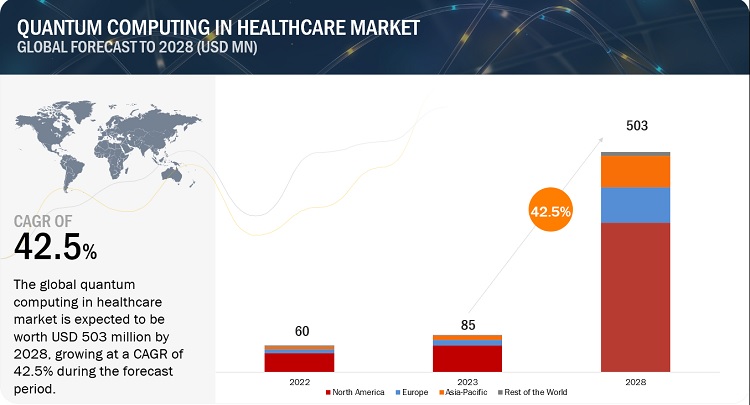
(Source: marketsplash.com)
- The quantum computing market usage statistics by region are followed by North America (40%), Europe (25%), Asia Pacific (20%), Latin America (7.5%), and Middle East and Africa (7.5%).
Statistics by Usage
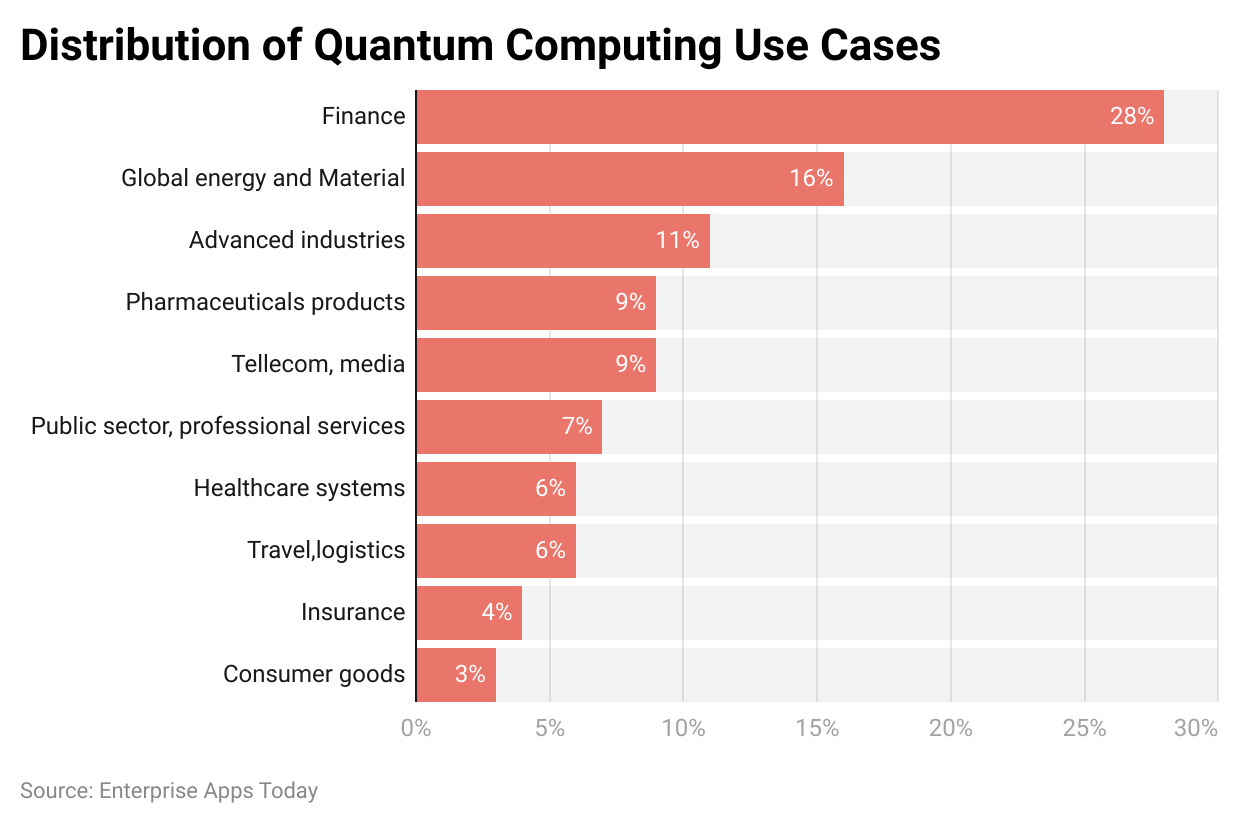
(Source: marketsplash.com)
- The utilization of quantum computing statistics by usage in various sectors and industries in 2023 is described above graph.
- The maximum usage of quantum computers is observed in the finance sector by 28%.
- Other market share in different sectors are followed by Global energy and materials (16%), advanced industries (11%), pharmaceuticals products (9%), telecom, media (9%), Public sector, professional services (7%), healthcare system (6%), travel, logistics (6%), insurance (4%), and consumer goods (3%).
Top Trends of Quantum Computing
- Quantum computers are power powerful course for doing vital tasks with proven super-polynomial speed-up. Thus building a large fault-tolerant quantum processor is an effective factor that allows in running of specific superconducting circuits required in the tech market.
- Cyber security is another trend as researchers have been working for many years to develop “quantum-safe” encryption.
- A quantum random number generator is required for cryptography by Quantum Dice and IDQuantique companies, which includes quantum optics for generating a true source of randomness.
- Quantum secure communications, especially quantum key distribution is a method of connection that uses properties of quantum physics for exchanging secured cryptographic keys.
- Furthermore, trends of quantum computing are followed by QC Applications, quantum machine learning, healthcare, weather forecasting, and quantum autonomous transportation.
Quantum Computing Statistics by Website
By Country
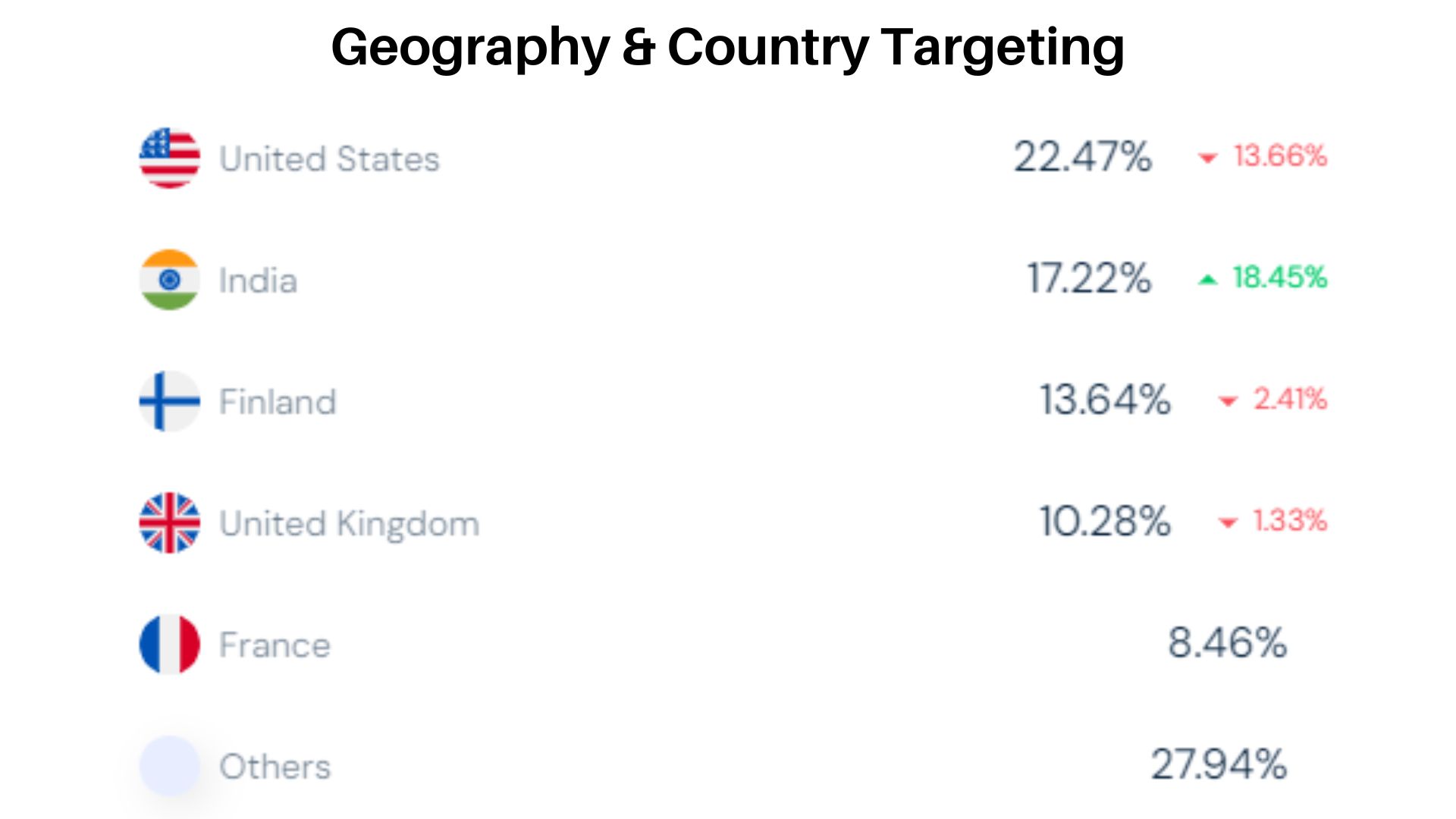
(Source: similarweb.com)
- As of 2023 according to Similarweb reports, the United States of America had a 22.47% of total traffic on quantumcomputing.com, but it recorded a decrease in total website visitors by 13.66%.
- Other countries recorded total website visitors followed by India with 17.22% of visitors (increased by 18.45% of visitors), Finland with 13.64% (-2.41%), United Kingdom with 10.28% (-1.33%), France (8.46%) and other countries collectively made around 27.94%.
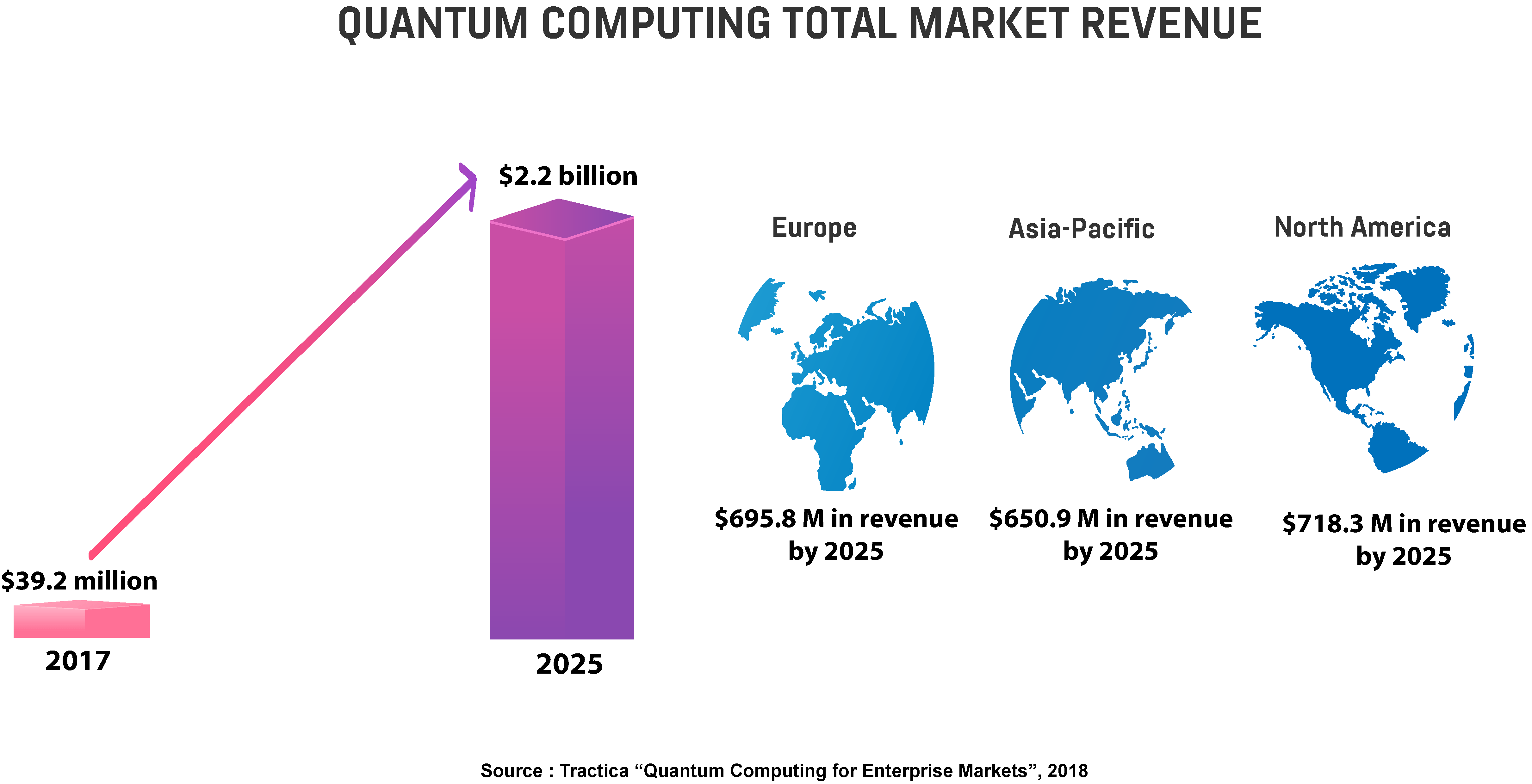
(Source: richardvanhooijdonk.com)
- In the coming year, the industry of quantum computing is going to become multi-billion dollar in the coming years.
- In 2025, the market revenue of North America in quantum computing is expected to earn more than $718.3 million.
- Other region's market shares are followed by Asia-Pacific ($650.9 million), and Europe ($695.8 million).
- According to research reports, the global market revenue of quantum computing by the end of 2025 is predicted to be $2.2 billion.
- According to the research of Gitnux, the end users' spending on quantum computing is supposed to rise from around $830 million by 2024 to $8 billion by the end of 2027.
- The market share of this industry is projected to grow at a CAGR of 56% by 2029.
- According to the reports of MarketandMarkets by the year 2026, the market size of quantum computing is predicted to be $1.7 billion.
Efforts of Quantum Computing
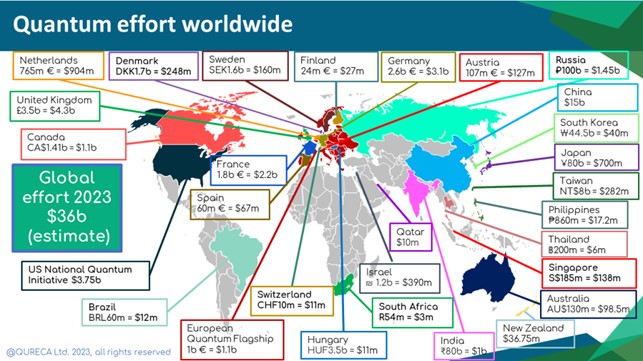
(Source: idquantique.com)
- According to Qureca, the global effort of public quantum in January 2023 was around $36 billion.
- The above diagram describes the quantum efforts statistics by different countries around the world.
- China with maximum efforts of 415 billion followed by the United Kingdom $4.3 billion Germany ($3.1 billion), the United States ($3.75 billion), France ($2.2 billion), Russia ($1.45 billion), Europe ($1.1 billion), and India ($1 billion).
- Furthermore, others are followed by Netherlands ($940 million), Denmark ($248 million), Sweden ($160 million), Finland (27 million), Austria (127 million), South Korea ($40 million), Japan ($700 million), Taiwan (282 million), Philippines ($17.2 million), Thailand ($6 million), Singapore ($138 million), Australia ($98.5 million), New Zealand ($36.75 million), South Africa ($3 million), Israel ($390 million), Qatar ($10 million), Hungary and Switzerland ($11 million) each, and Brazil ($12 million).
Challenges
- The primary challenges in quantum computing that most organizations face are compatibility and accessibility.
- Around the world, 43% of organizations are worried about the complexity of integrating the system into IT infrastructure.
- 48% of survey respondents faced security-related issues in their organizations.
Conclusion
As of today, after completing the article on Quantum Computing statistics it can be stated that the overall market is growing enormously around the world as it has mostly been implemented by leading organizations, IT sectors, and healthcare departments for various research purposes.
This research has enabled many advantages in different fields and from the overall research it can be concluded that by the end of 2023, the global market share is expected to be $ 866 million. This article includes many informative statistics that will help in understanding the topic in detail
FAQ.
Some challenges that IT leaders must know are Qubit’s short life span, lack of scalability, inefficient error correction, demand for highly complex hardware, limited availability of digital infrastructure, inadequate availability of software, less scope for strategic implementation, and ineffective security protocols.
As quantum computing helps in exploring many effective solutions to different problems many AI applications use this computing for effective planning and scheduling.
Yes, it can be said that The LPU technology has the power of this computing technology, moreover, this is available in a very small factor that can work at room temperature.
In the real world, this helps in analyzing patterns of traffic and running simulations in cities that allow for improving effective transportation and reducing congestion.

Barry is a lover of everything technology. Figuring out how the software works and creating content to shed more light on the value it offers users is his favorite pastime. When not evaluating apps or programs, he's busy trying out new healthy recipes, doing yoga, meditating, or taking nature walks with his little one.